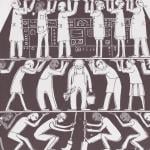Welcome readers! Please subscribe through the buttons on the right.
(Read this series from its beginning here.)

The contrasting social locations of these recipients of Jesus’ work is one of the most consequential comparisons for our justice work today. We’ll discuss more in a moment which social location is centered.
There is so much to address in both of these stories. Worth exploring in our limited time this week is the woman’s willingness to violate the letter of the Torah and her community’s taboos about uncleanliness and touching those considered unclean. By violating those rules, she arrives at the life-giving spirit and intention of the Torah according to her interpretation. Imagine how the woman in this story had to wrestle with the Torah’s commands to find the courage to reach out and touch even the hem of Jesus’ garment.
“When a woman has her regular flow of blood, the impurity of her monthly period will last seven days, and anyone who touches her will be unclean till evening. Anything she lies on during her period will be unclean, and anything she sits on will be unclean. Anyone who touches her bed will be unclean; they must wash their clothes and bathe with water, and they will be unclean till evening. Anyone who touches anything she sits on will be unclean; they must wash their clothes and bathe with water, and they will be unclean till evening. Whether it is the bed or anything she was sitting on, when anyone touches it, they will be unclean till evening. If a man has sexual relations with her and her monthly flow touches him, he will be unclean for seven days; any bed he lies on will be unclean. When a woman has a discharge of blood for many days at a time other than her monthly period or has a discharge that continues beyond her period, she will be unclean as long as she has the discharge, just as in the days of her period. (Leviticus 15:19-25)
In the longest of the Dead Sea Scrolls, the Temple Scroll, we read of special places, quarantine spaces, that were to be kept outside the city and its population for lepers, those with skin diseases, those “afflicted with discharge,” menstruating women, and women giving birth (see Johann Maier, The Temple Scroll: An Introduction, Translation, and Commentary, p. 14).
This passage from Leviticus, the social taboos for those considered unclean, and restricting those considered unclean to areas designated for quarantine away from the rest of the community might also explain why she was so reluctant to come forward in the story. She feared reprisal for the violation of even being in a crowd bumping into each other, much less touching Jesus too.
This leads me back to the subject of social location and the tension we find in this narrative between the stories of Jairus’ daughter and the woman sick for 12 years. Not all teachings are universal. Today, some things are acceptable for those in marginalized social locations but not acceptable or even offensive if practiced by those who are more centered or socially privileged. There are things women can say and do that men should not. There are actions appropriate for Black communities and other communities of color that are not acceptable for White people. During Pride month, for example, there are some actions that straight people should not do because they would be appropriative. Social location matters.
When we read this week’s narrative, we typically contrast the social locations of Jairus, a named synagogue leader, and this nameless woman who, because of her condition, is meant to live her life in quarantine and exiled from the rest of the community, including her family.
But the story actually prioritizes and centers this marginalized woman over the named, male, synagogue leader.
This is what liberation theologians refer to as a preferential option. What is a preferential option and how could it apply to our social context today? We’ll discuss that in part 3.













